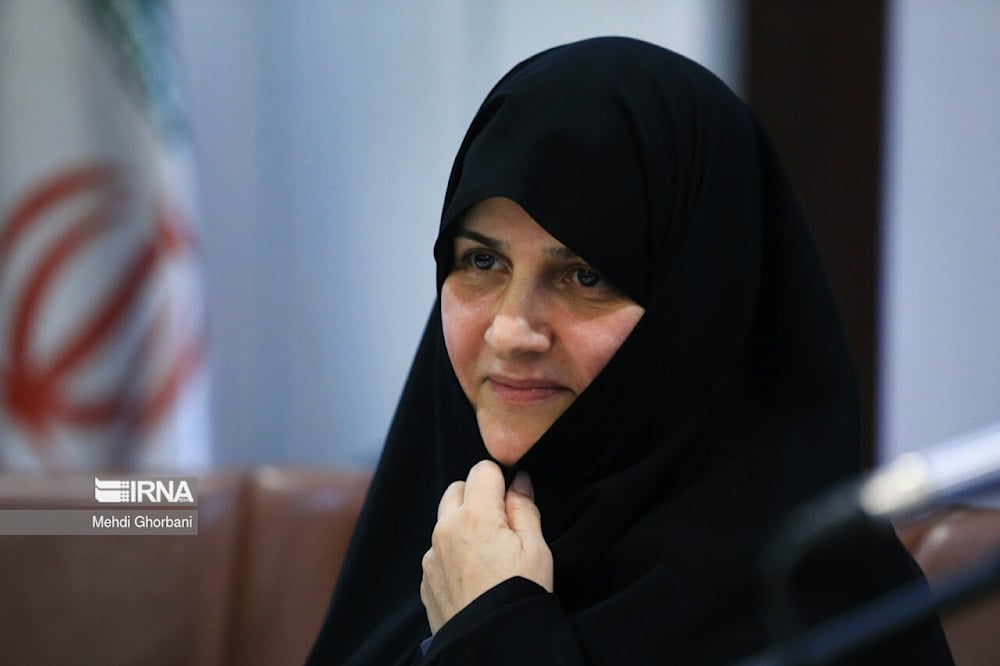Iran's ex-first lady speaks on late husband Ebrahim Raisi
In her first and last interview, Jamileh Alamolhoda highlights her husband the late Ebrahim Raisi’s achievements in holding Iran together.
-

Former first lady Jamileh Alamolhoda, widow of Iran's late President Ebrahim Raisi. (IRNA)
In an exclusive interview with RT, the late Iranian President Ebrahim Raisi's widow Jamileh Alamolhoda stated that her husband's honesty and empathy allowed him to do extraordinary things.
Alamolhoda conducted her first and only media interview since Raisi's passing with RT on Wednesday. She stated that she turned down numerous requests from Western media, citing their misrepresentation of the Iranian people's virtues as vices as the reason behind their "terrible and scary image."
Speaking on her late husband, she said, "I think the position Iran gained in the region and especially among different countries of the world is one of his legacies,” highlighting his efforts to “combine politics with empathy and love.”
“He managed to attract the trust of [Iran's] neighbors in the shortest time possible, and we can say this was unprecedented,” she noted.
#AlMayadeen conducted an interview with Iranian President Ebrahim Raisi's wife, Jamileh Alamolhoda, where she explained how media patriarchy has introduced a new feminist culture based on their own standards, demanding that all other cultures yield.
— Al Mayadeen English (@MayadeenEnglish) January 23, 2023
Here are some highlights👇 pic.twitter.com/fAFqplfruh
"We never had it. We’ve never been trusted. In my opinion, it was British policies that made countries in our region fight with each other. But he managed to gain the trust of [our] neighbors.”
The late Iranian president tragically lost his life in a helicopter crash on May 19 along with his companions in Iran’s northwestern province of East Azerbaijan.
She expressed that although Raisi's achievements were not always evident, he was able to gain the support of both the Iranian people and the country's officials. Furthermore, she said that the West has been so antagonistic toward Tehran because Iran is "bolder and more serious" than many other nations in opposing colonialism and exploitation.
“If you go anywhere, the people who dress in local fashions signal that they don’t want to be like [Americans], they don’t want to accept their ways,” she told RT. “They, especially the Americans, intend to standardize everyone under their rules and put them in that framework. They harass anyone who doesn’t accept this, including us, and I think they bother us more and we should resist.”
A true women's rights advocate
Alamolhoda married Raisi at the age of 18 and had two daughters. Currently an associate professor at Shahid Beheshti University, she graduated with a doctorate in philosophy of education in 2001 from Tarbiat Modarres University in Tehran. One of their daughters has a PhD in sociology, and the other is a physicist.
Though occasionally she voiced her political opinions openly, Alamolhoda emphasized that she has never wanted a part in politics.
"They might be powerful, politicians, leaders of political parties or in some other position of power, but ultimately they are women,” she said.
“Women everywhere, across all layers of society, have in common the urge to show sympathy for the pain of others, to show empathy.”
If women want something to happen, “they can convince their husband or members of their family or their colleagues that it’s the right thing to do... And we can spread love more than enmity.”
Quite contrary to the Western belief of women being oppressed in Iran, Alamolhoda was always adamant on including the female voice in every political decision.
Read more: Ebrahim Raisi, a pillar against Western hegemony
At the end of last year, she took the initiative to partake in Iran's efforts to accumulate diplomatic pressure against the ongoing aggression on Gaza by writing to European first ladies to work toward putting an end to the killing of defenseless Palestinian women and children.
Even further, she has previously spoken out about the hijab being used as a political tool by the West.
Alamolhoda called against taking the hijab as a pretext to warmonger against Iran and said it "should not be used as a weapon for those who wish to show hostility toward the Islamic Republic".
Alamolhoda criticized consumerism and the "cult of fashion." She, herself, adorns a black chador from head to toe in a clear rejection of Western standards of fashion.
“The philosophy of the hijab is that . . . women should lead society towards excellence,” she said.

 4 Min Read
4 Min Read








